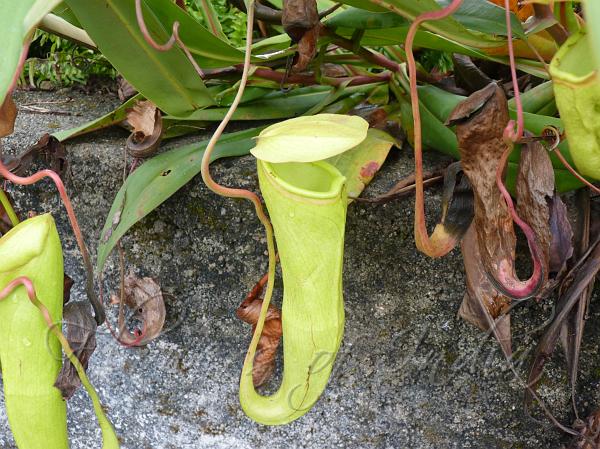|
| Indian Pitcher Plant |
|

|

| File size | 1890872 |
| Original date | 3/31/21 12:17 PM |
| Resolution | 3264 x 2448 |
| Flash | Flash did not fire, auto |
| Focal length | 7.1mm |
| Exposure time | 1/40s |
| Aperture | 3.0 |
| Focus Distance | |
| Metering Mode | Multi-segment |
| Camera make | Panasonic |
| Camera model | DMC-FZ35 |
| Sensor type | OneChipColorArea |
|
|
|
|
Photo: |
Botanical name: Nepenthes khasiana Family: Nepenthaceae (Pitcher Plant family)
Indian Pitcher Plant is a carnivorous plant endemic to
the Khasi hills of
Meghalaya after which it is named. The species has a very localised
distribution and is critically endangered. The Khasi people call the plant
tiew-rakot, which means demon-flower or devouring-plant. The plant
has long, oblong-lanceshaped leaves. Some unusual leaves first look like normal
leaves, then develop a tendril at their tip, and finally the tip of the
tendril develops an amazing pitcher, with a lid on top. As the pitcher
matures, the lid turns a reddish hue. When an insect goes inside, the lid
closes, and the insect is eventually digested. The inflorescences are
compound racemes, 15-60 cm long, at branch-ends
with 10-25 cm long flower-cluster-stalks. The flowers are
actinomorphic, red greenish, about 8 mm in diameter. Tepals are
nectar-bearing, 3-4, velvet-hairy externally, and hairless inside. The
male flowers have the stamens with 2-24 filaments merged in column and
bilocular anthers. The female flowers have 3-4 carpels, velvet-hairy
ovary, superior, with numerous ovules and style with discoid stigma.
This is believed to be
the only species of Pitcher Plant found in India.
| Identification credit: Sankara Rao | Photographed in Meghalaya. |
• Is this flower misidentified? If yes,